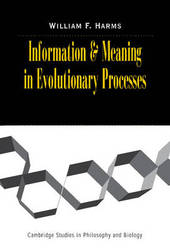
|
Information and Meaning in Evolutionary Processes
Hardback
Main Details
Description
The most significant legacy of philosophical skepticism is the realization that our concepts, beliefs and theories are social constructs. This belief has led to epistemological relativism, or the thesis that since there is no ultimate truth about the world, theory preferences are only a matter of opinion. In this book, William Harms seeks to develop the conceptual foundations and tools for a science of knowledge through the application of evolutionary theory, thus allowing us to acknowledge the legacy of skepticism while denying its relativistic offspring. This book will appeal to students and professionals in epistemology and the philosophy of science.
Reviews'I strongly recommend this book for anyone interested in pursuing the development of a biologically based naturalistic account of knowledge and the evolution of cognitive mechanisms. It is not an easy read but will more than repay the careful reader with suggestive insights and, I believe, a unique slant on the host of problems that we have inherited from the work of Donald Campbell.' Michael Bradie, Bowling Green State University 'This book contains original insights about information transmission and the evolution of meaning. After you read Part III the is/ought question will never look the same.' Brian Skyrms, University of California, Irvine
|